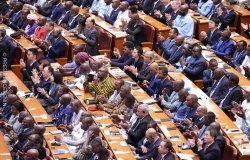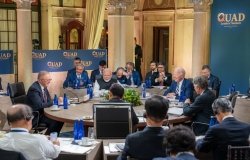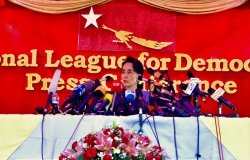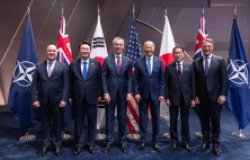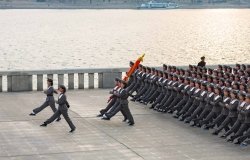Book Launch: Modernizing China's Military
David Shambaugh, Professor of Political Science and International Affairs/Director of the China Policy Program at The George Washington University and current Woodrow Wilson Center fellow; Admiral Dennis Blair, Senior Fellow, Institute for Defense Analyses; Ellis Joffe, Visiting Professor of Political Science, University of Michigan
Overview
BOOK LAUNCH:
MODERNIZING CHINA'S MILITARY:
PROGRESS, PROBLEMS & PROSPECTS
February 6, 2003
David Shambaugh, professor of political science and international affairs, and director of the China Policy Program, George Washington University; fellow, Woodrow Wilson Center
Commentators:
Adm. Dennis Blair, senior fellow, Institute for Defense Analyses
Ellis Joffe, visiting professor of political science, University of Michigan
China's military modernization calls for a comprehensive and sophisticated assessment of that country's military power and the implications for Beijing's foreign policy. On February 6, the Asia Program hosted a book launch for David Shambaugh's new volume, Modernizing China's Military: Progress, Problems & Prospects. After Shambaugh's presentation, Adm. Dennis Blair and Ellis Joffe offered their comments on the book.
According to Shambaugh, China's military modernization has progressed more significantly in the past five years than during the previous two decades. Annual national defense expenditures now amount to 17 percent of the total national budget, and the Chinese government has promoted military modernization and professionalization in a systematic way. However, as Shambaugh estimated, China's weapons system as a whole is still two decades behind the state of the art systems in the United States. While the Chinese army is trying to catch up with the West by procuring weapons from Russians, and more importantly, by developing its own military industry, military technology and weaponry are moving ahead even quicker in the United States and other major powers.
Even so, Shambaugh predicted that China is likely to become the greatest regional power by 2020, forcing neighboring countries to make a strategic choice between counterbalancing the new power or joining the bandwagon with China. While endorsing U.S.-China military exchanges, Shambaugh argued that the United States should monitor closely military technology transfers to China in order to impede the process of China's military modernization.
Adm. Dennis Blair, until last year commander in chief of all U.S. military forces in the Asia-Pacific region, agreed with Shambaugh that military exchanges between the United States and China could help prevent the two countries from unintended escalation of tension, as each would be better aware of the other side's intentions and capabilities. Ellis Joffe observed the increasing importance of the Chinese military in China's external affairs and domestic politics, as Beijing has used the army or threatened to use force in dealing with neighboring countries on several occasions, and civilian leaders have to consult with military leaders on critical national issues. Both Blair and Joffe agreed that Shambaugh's book has provided the most comprehensive and in-depth analysis of China's military modernization.
Drafted by Gang Lin, Asia Program Associate
Robert M. Hathaway, Director, Asia Program
Ph: (202) 691-4020
Hosted By

Indo-Pacific Program
The Indo-Pacific Program promotes policy debate and intellectual discussions on US interests in the Asia-Pacific as well as political, economic, security, and social issues relating to the world’s most populous and economically dynamic region. Read more
Thank you for your interest in this event. Please send any feedback or questions to our Events staff.

